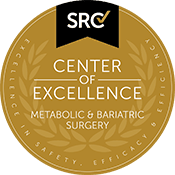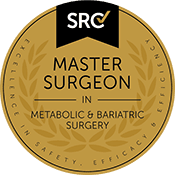
- Expertise
- Compassion
- Success
Lose the Weight and
Gain Back Your Life!
Gastric Bypass Surgery Sydney
Stomach Bypass Procedure
For individuals suffering from morbid obesity who have tried unsuccessfully to lose the excess weight through diet and exercise, gastric bypass weight loss surgery is often the most effective solution. At Advanced Surgicare, Dr. V. Kuzinkovas treats patients seeking gastric bypass surgery in Sydney and the surrounding area. Roux-en-Y gastric bypass surgery is a common and effective technique that helps morbidly obese patients lose excess weight. Dr. Kuzinkovas performs the gastric bypass procedure laparoscopically to reduce incisions, blood loss and recovery time.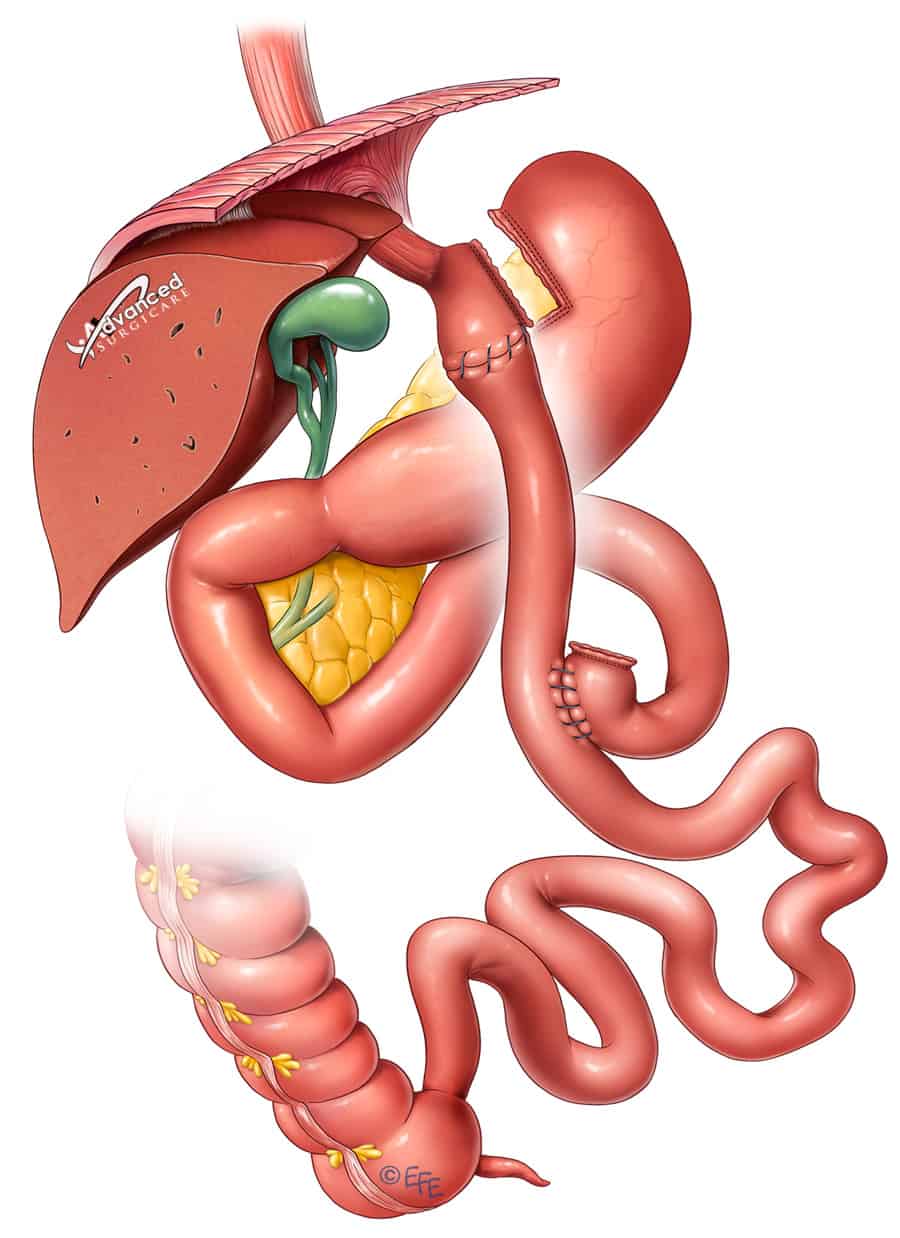
Gastric Bypass Quick Info:
- Operating time of approx. 60 to 90 mins
- Average hospital stay of 2 to 3 days
- Average time off work 2 weeks
- Procedure is reversible
- Weight loss surgery financing plans available
Advantages Of Gastric Bypass
- Best known long term operation
- Rapid initial weight loss
- Improves or totally resolves diabetes
- Maximum amount of weight loss
Gastric Bypass Risks:
- Gastric stomal (marginal) ulcers may occur
- Leakage or separation of the surgical staples
- Additional follow-up visits required, compared to other procedures, such as sleeve gastrectomy
- Alterations in normal digestion
Find out more about gastric bypass with the following links.
Roux-En-Y Gastric Bypass
This educational video will explain the normal process of digestion, the Roux-En-Y gastric bypass procedure and how weight loss will occur upon completion of the surgery.
Gastric Bypass Surgery Results
The gastric bypass procedure reduces your food intake, allowing you to feel fuller faster while eating less. You can expect to feel satisfied with smaller meals after gastric bypass, and your body will absorb fewer calories and nutrients from the food you consume, which further encourages weight loss. You may lose up to 70% of excess kilograms.
Gastric Bypass Helps You Lose Weight
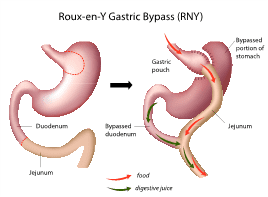 Gastric bypass surgery helps patients lose excess weight in three different ways:
Gastric bypass surgery helps patients lose excess weight in three different ways:
- It restricts the amount of food that a person can ingest. This is referred to as the restrictive component of bariatric surgery.
- It limits the amount of nutrients that the body can absorb. This is referred to as its malabsorptive component.
- Roux-en-Y gastric bypass alters the levels of gut hormones such as peptide YY (PYY) and glucagon-like peptide-1 (GLP-1), leading to more satiety and satisfaction after a small meal intake. This is referred as a metabolic component of gastric bypass surgery.
The Gastric Bypass Procedure
Weight loss surgery in Sydney with the laparoscopic Roux-en-Y technique reduces the size and capacity of the stomach. The typical empty stomach is the size of a fist but may stretch to hold 1.5 Liters of food and fluid or an astonishing 3.9 liters when extremely full. Gastric bypass decreases the stomach size to that of a thumb, and the new pouch can hold only up to ¼ cup of food at a time.
After Dr. Kuzinkovas reduces the size of the functional portion of the stomach, he creates a small opening (stoma) between the intestine and stomach. He attaches the reduced stomach pouch to a part of the small intestine, forming a “Roux” connection. The Roux-en-Y technique reduces the absorption of calories and nutrients by bypassing the area of the small intestine (duodenum and jejunum) responsible for this function.
Gastric bypass surgery helps patients feel satisfied with a limited quantity of food that fills the smaller stomach pouch. The stoma delays gastric emptying, so the full sensation lasts longer. By bypassing the duodenum and proximal jejunum, the body absorbs fewer calories and nutrients for optimal weight loss.
Dr. Kuzinkovas performs gastric bypass laparoscopically, which comes with several benefits, including a lower infection risk, faster recovery, shorter stay in hospital and fewer complications after the procedure.
After Gastric Bypass Surgery
Immediately after the procedure, patients must adhere to a clear liquid diet for several days. They can then advance to a diet consisting of pureed foods. It is extremely important for patients to drink a sufficient amount of fluids, so they do not become dehydrated.
One Month Post-Op:
Approximately one month after the procedure, individuals advance to a transitional diet, incorporating more regular foods into their diet. During this phase, it is common for patients to feel slightly ill or experience a decrease in energy levels as they adapt to the changes in their digestive system and adopt healthier eating habits. This is also the period in which individuals usually experience the fastest weight loss. Certain patients may lose weight at a rate of about 5-7 kilograms per month, during this phase.
Six Months Post-Op:
About six months after gastric bypass surgery, patients adopt their long-term diet, which helps them maintain their desired weight over the long run. For the rest of their lives, patients will eat limited portions of regular foods.
Two Years Post-Op:
 During the first two years following the procedure, individuals who have undergone gastric bypass surgery in Sydney with Dr. Kuzinkovas can expect to lose about 70-80 percent (or more) of their excess weight. However, some individuals can regain about 10 percent of the lost weight during the second to fifth year following the procedure.
During the first two years following the procedure, individuals who have undergone gastric bypass surgery in Sydney with Dr. Kuzinkovas can expect to lose about 70-80 percent (or more) of their excess weight. However, some individuals can regain about 10 percent of the lost weight during the second to fifth year following the procedure.
To help patients avoid this propensity to regain weight, Advanced Surgicare offers nutrition counseling as well as psychological counseling when needed. In order to maintain their ideal weight over the long term, individuals must make a concerted effort to maintain a healthy lifestyle and engage in regular exercise for the rest of their lives.
Am I A Candidate For Gastric Bypass?
Dr V. Kuzinkovas can discuss your candidacy for weight loss surgery with Roux-en-Y Gastric Bypass during a consultation at our Sydney office. Generally, candidacy comes down to your body mass index (BMI) and whether you have comorbid conditions caused by or related to obesity. Sleep apnea, asthma, type-2 diabetes and other medical conditions often coincide with obesity and are considered comorbidities. Someone with a BMI of at least 40 or a BMI of 30 or higher with at least one comorbid medical issue may qualify for bariatric surgery. However, people suffering from more advanced, multiple comorbidities may not be eligible due to the high surgical risks of undergoing anesthesia.
Our obesity surgeon determines candidacy on a case-by-case basis. The type of weight loss surgery depends on your BMI and comorbidities, but you must be at least 18 years old and have tried and failed to lose weight with traditional methods.
Use our BMI calculator to determine your body mass index and schedule a consultation with our renowned bariatric surgeon in Sydney to discuss your health and candidacy.
Take The First Step In Losing Weight
Take the first step in your weight loss journey and find out if you are a suitable candidate for either gastric bypass surgery or another type of bariatric surgery such as Lap Band surgery or Sleeve Gastrectomy.
To schedule a consultation with Dr. Kuzinkovas, please contact Advanced Surgicare Clinic by calling 1300 551 533.
Request A Free Phone Consultation
Schedule a free phone consultation with Dr. Kuzinkovas
Click Here for Free Phone ConsultOur Locations
Our doctors are true professionals and very passionate about their job.
Our team is very caring, ethical, trustworthy, friendly and devoted.
South Eastern Sydney
(Main Office)
Advanced Surgicare
Suites 501/502, Level 5
St George Private Specialist Consulting Suites
131 Princes Highway
Kogarah NSW, 2217
(entrance via South St)
Fax: 02 9588 9471


Dubbo, NSW
Advanced Surgicare
Macquarie Health Collective Specialists Centre
Suite 1B, Ground Floor
165 Brisbane Street
Dubbo 2830, NSW
Fax: 02 9588 9471
